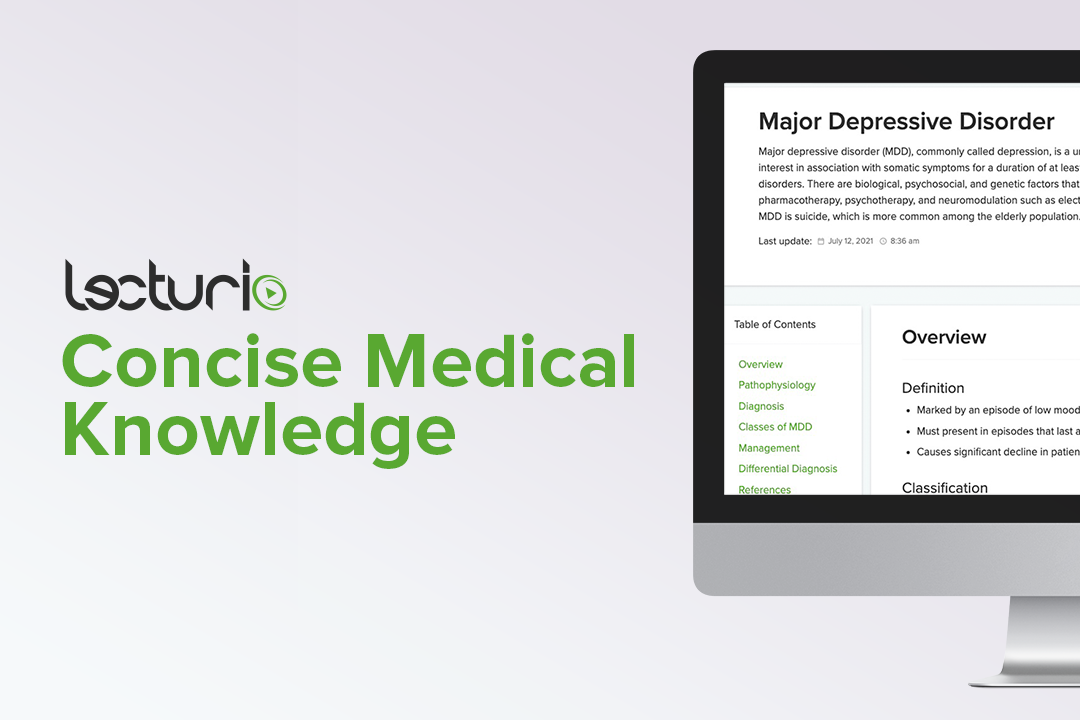Playlist
Show Playlist
Hide Playlist
Depression: Case Study and Screening
-
Slides Depression ChronicCare.pdf
-
Download Lecture Overview
00:01 Okay. Today, we’re going to be discussing depression. 00:04 Now, depression is something we see very commonly in primary care. 00:08 It's estimated that up to 40% of patients presenting to primary care practices have some form of depressive symptoms. 00:16 I thought we’d start with a case here just to illustrate some of the history and the symptoms of depression. 00:22 So, I’ve got a 30-year-old female. 00:24 She complains of fatigue and a lack of interest in her normal activities for the past three months. 00:30 It's a very rare patient who comes out and says I'm depressed as their chief complaint, but feeling fatigue, feeling down, not being – not feeling like yourself, these vague symptoms, that's a lot more common in terms of the presentation. 00:44 She reports that she's depressed only sometimes and denies any recent stress. 00:49 That’s a good question to ask. 00:51 She also has no previous history of any mental health disorders. 00:54 Now, clearly, there's more history to be obtained from this patient. 00:58 But what’s the most critical additional history to obtain from her? So, should it be, A, any family history of thyroid disorders; B, a history of any abnormal bleeding, thinking about anemia; C, any history of suicidal ideation; or D, a family history of mental health disorders? Which one do you think it is? The answer is C, history of suicidal ideation. 01:21 Why? Because the question asked the most critical bit of information. 01:27 By far the most critical information in her history is the risk of suicidal ideation or suicidality, the worst outcome in depression is suicide. 01:39 And depression, of course, predisposes patients to suicide. 01:43 So, it’s better to ask about, directly bringing out in the open. 01:47 So, how do we define major depressive disorder? So, it’s defined by either depressed mood or that term anhedonia, that loss of pleasure in doing your normal activities, for at least two weeks. 01:58 So, it doesn't take a long duration of symptoms to be defined as a major depressive disorder, but it does require impairment in function as well. 02:07 And then five of the following nine symptoms should be present nearly every day. 02:11 So, it's not like just one or two days you feel the blues and therefore you have major depressive disorder. 02:17 This has to be pervasive, causes impairment in function and has to be present on most days. 02:22 Those nine symptoms can include depressed mood, anhedonia as we mentioned, weight change or change in appetite, change in sleep, change in activity, fatigue, feelings of guilt, or worthlessness, difficulty in concentrating on things, and suicidal thoughts. 02:48 So, five of these nine have to be present for at least two weeks along with either the depressed mood or anhedonia and that's how we define major depressive disorder. 02:57 What about screening for depression? I mentioned how common it is in primary care. 03:00 Should we be looking for it in everybody? Actually, the United States Preventive Services Task Force (or USPSTF) suggests that, yes, we should be screening for depression among adults as long as there’s capacity for follow-up. 03:13 That means that we can continue to see the patients for the depression and treat it proactively. 03:18 How do we screen? The patient health questionnaire is nine items and it has a good sensitivity and specificity for diagnosing depression. 03:28 But there's another scale called the Patient Health Questionnaire 2, which is just two items related to depression or anhedonia in the past month. 03:38 That's very sensitive for diagnosing depression. 03:41 And if it’s negative, the risk of the patient having depression is very, very small and they don't need more screening.
About the Lecture
The lecture Depression: Case Study and Screening by Charles Vega, MD is from the course Chronic Care.
Included Quiz Questions
According to the USPSTF, who should be screened for depression?
- All adults
- Women between the ages of 24 and 35
- Adolescents between the age of 12 and 18 with a family history of mental disorders
- Men between the ages of 18 and 65
- Men and women over the age of 65
What is the minimum duration of symptoms for a diagnosis of unipolar depression in adults?
- 2 weeks
- 6 weeks
- 6 months
- 3 months
- 3 weeks
Which of the following is NOT a symptom criterion for unipolar depression?
- Compulsive behavior
- Fatigue
- Feelings of guilt
- Weight loss
- Hypersomnia
Customer reviews
5,0 of 5 stars
| 5 Stars |
|
2 |
| 4 Stars |
|
0 |
| 3 Stars |
|
0 |
| 2 Stars |
|
0 |
| 1 Star |
|
0 |
Very good informative. To the point. Based on real experiments.
1 customer review without text
1 user review without text




